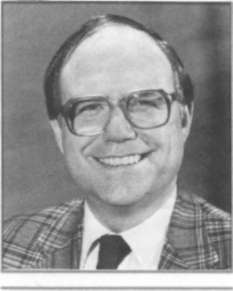 |
Home | Search | Browse | About IPO | Staff | Links |
 |
Home | Search | Browse | About IPO | Staff | Links |
|
Politics Restoration of educational quality in Chicago 
By CHARLES N. WHEELER III The winds of reform are whistling about Chicago's shaky public school establishment, presenting a rare opportunity for concerned citizens to restore the educational quality of the nation's third largest school system. Meaningful change should be welcomed by Chicago parents, who so far this school year have weathered a 19-day teachers' strike, statistical evidence that their schools lag far behind the Illinois average in student achievement, and news that their real estate taxes are going up some $135 million to pay for all this. They've heard U.S. Education Secy. William J. Bennett call the Chicago system the worst in the nation, and they've listened to Gov. James R. Thompson quote business leaders complaining about the 50 percent failure rate of city schools, compared to the guarantee of 99.9 percent performance customers demand of them. Granted, it took a lot of chutzpah for Bennett to criticize Chicago schools, serving as he does as the point man on education for a national administration for which school aid is no priority. Last school year, for example, Illinois districts received about $520 million in federal funds, about $16 million less than they received in 1979-80, the last full school year of the Carter administration. Indeed, four years ago the Chicago Board of Education had to take the Reagan administration to court to free up desegregation assistance money promised to city schools under a negotiated consent decree. And the analogy Thompson's business sources seek to draw between education and industry is not apt. How many plant managers must use whatever raw materials arrive at their receiving dock, regardless of suitability? How many have only limited, part-time oversight of the process, relying the rest of the way on subcontractors for whom there is no quality control? No, you really can't apply the standards of a Xerox Corp., whose chairman expects "100 percent defect-free parts" from its suppliers, to a school system trying to educate mostly disadvantaged youngsters in an environment in which drugs, gang violence and, sadly, parental apathy are far too prevalent. Still, that does not absolve the Chicago board. The city's education hierarchy, the board, Supt. Manford Byrd Jr. and the centralized administration rightly are coming under close scrutiny from a host of reformers, some of whom already have their knives poised to slice the 420,000-student system into a score of neighborhood-based districts. Gripes about the central bureaucracy —slow to respond, too many well-paid supernumeraries, insensitive to teachers' needs and parents' wishes — may be well-founded. But merely restructuring the system won't solve its complex problems; the staff of the Illinois State Board of Education studied decentralization in light of Chicago's demographics and reported doubts that poor student achievement could be significantly changed solely by a new governance structure. The key ingredient improving schools, the study said, is effective parental involvement. That's not surprising: at a personal level, a kid whose mom or dad makes sure he or she is in school every day, takes time to check over returned assignments each night, and insists that all homework be done before the television goes on, is being sent a clear message that schooling is important. And on a community level, large numbers of parents who take an active interest in school affairs are a sure cure for administrative complacency. Other factors are significant as well. Clearly a principal's strong leadership major element in bringing a major element in bringing out the in a school's faculty, and a teacher can inspire not only students, also colleagues. 4/December 1987/Illinois Issues How can the Chicago system nurture this winning combination of interested parents, strong principals and dedicated teachers? Certainly, increasing the degree of local control is a logical approach, and it could be tested without shattering the district. Allowing parents, teachers and the local community to share in making decisions about budgeting, curriculum and personnel seems a sure way to increase involvement. Giving principals greater leeway in choosing the teachers for their schools, and easing out the incompetent or unwilling, would strengthen their leadership role. And inviting classroom teachers to help set budget priorities and education policies enhances their stake in the school. Such an experiment in self-government, of course, would require the cooperation of the Pershing Road administrators and of the Chicago Teachers Union. While neither could be expected to share its current prerogatives enthusiastically, each would likely agree grudgingly when faced with two compelling facts: complete decentralization as the likely alternative, and genuine reform as an indispensable condition for new state dollars for Chicago schools. To turn the reformers' hopes into student accomplishments will take money. More dollars will be needed for regular classrooms, both to reward teachers who excel and to assure adequate supplies and equipment; moreover, funds must be increased for special programs designed to compensate for the disadvantaged background and difficult environment of so many city youngsters. Now, the state's commitment to such efforts is disgraceful. In early childhood education, for example, there's only enough money this year to serve about one of each 16 at-risk preschoolers, while current funding for truant and dropout programs will reach only about one-third of more than 50,000 at- risk young people around the state. Thompson plans to seek a "modest" income tax hike for education next year, and Senate President (D-8, Oak Park) also frankly admits the need for additional revenue. Dedicating the tax hike proceeds to the schools would free up normal revenue growth for other state programs, including, one would hope, a cost-of-living increase for welfare recipients. Indeed, that itself might help nudge upwards the classroom performance of some among the two-thirds of public school children in Chicago who come from low income homes. December 1987/Illinois Issues/5 |
|
|